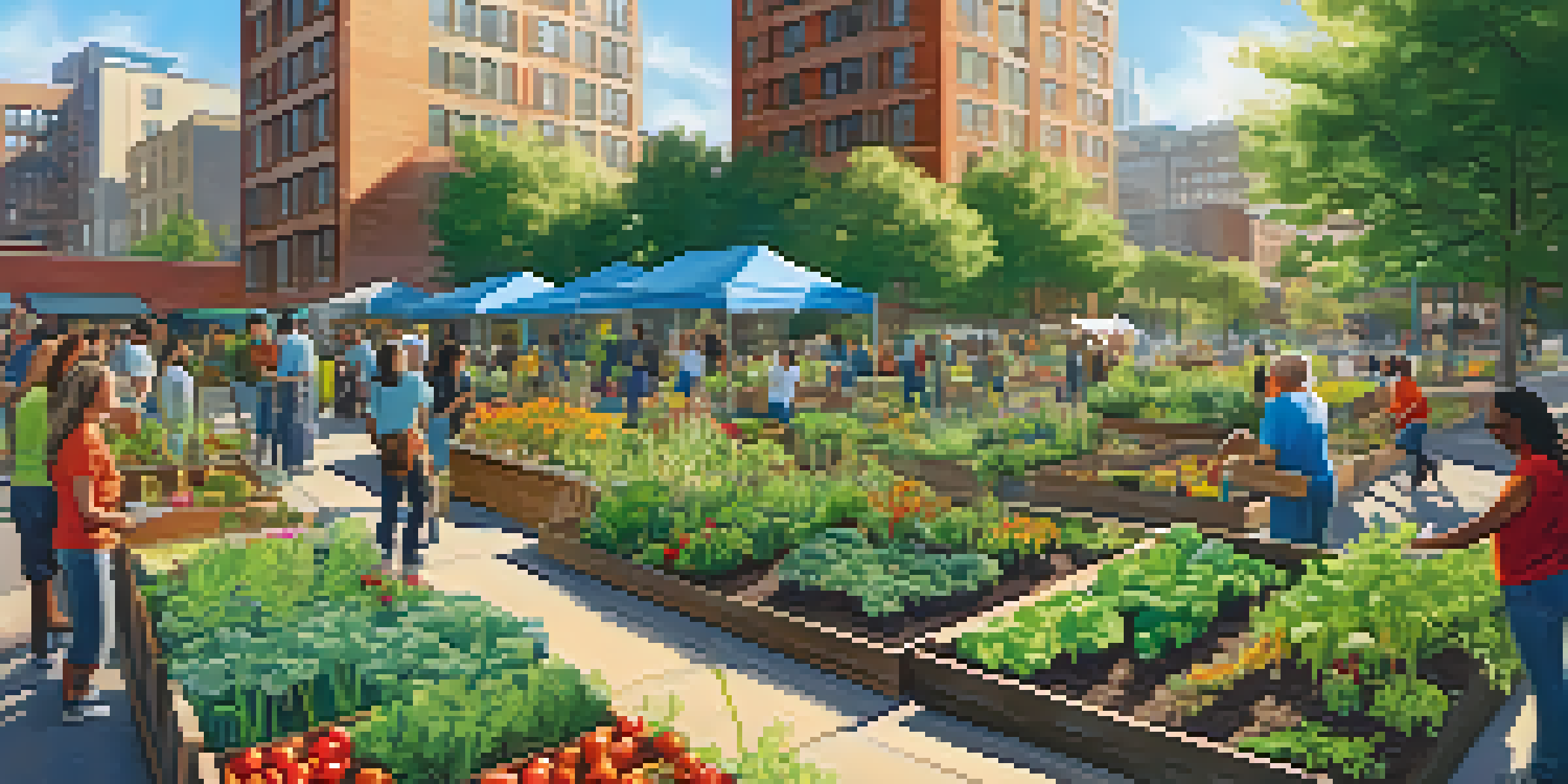Exploring the Role of Volunteers in Urban Farming

Understanding Urban Farming and Its Importance
Urban farming refers to the practice of cultivating food in urban areas, which can range from community gardens to rooftop farms. This movement has gained traction as cities seek sustainable solutions to food production while promoting green spaces. Urban farming not only provides fresh produce but also fosters community engagement and environmental awareness.
The greatness of a community is most accurately measured by the compassionate actions of its members.
In urban settings, where access to fresh food can be limited, these farms serve as vital resources. They address food deserts, where residents may struggle to find affordable, healthy options. By transforming vacant lots or underutilized spaces into productive gardens, urban farming helps to enhance food security in cities.
Moreover, urban farms contribute to the reduction of the urban heat island effect and improve air quality. They create a habitat for wildlife and promote biodiversity, which is essential in densely populated areas. The integration of green spaces into urban environments ultimately leads to a healthier and more vibrant city.
The Role of Volunteers in Urban Farming
Volunteers are the backbone of many urban farming initiatives, bringing diverse skills and enthusiasm to the projects. They assist with a wide array of tasks, from planting and weeding to harvesting and educating the community about sustainable practices. Their involvement not only helps farms operate efficiently but also enriches the overall experience for everyone involved.

Additionally, volunteering in urban farming can be a transformative experience for individuals. It allows them to connect with nature, learn about agriculture, and meet like-minded community members. This sense of belonging can be especially valuable in urban environments, where isolation can be a common issue.
Urban Farming Enhances Food Security
Urban farming transforms underutilized spaces into vital resources that provide fresh produce and alleviate food deserts.
Volunteers often gain practical knowledge about gardening techniques and sustainable practices that they can apply in their own lives. This knowledge transfer is essential for cultivating a culture of sustainability and environmental stewardship within communities. By actively participating, volunteers become ambassadors for urban farming and inspire others to get involved.
Benefits of Urban Farming for Volunteers
Engaging in urban farming offers numerous benefits for volunteers beyond just contributing to the community. Firstly, it provides an opportunity for physical activity, which can improve health and well-being. Working in the soil and tending to plants can be a refreshing break from the sedentary nature of modern urban living.
To plant a garden is to believe in tomorrow.
Moreover, volunteers often report increased mental well-being after spending time in nature and participating in group activities. Gardening has been shown to reduce stress and promote mindfulness, creating a calming effect that can enhance overall quality of life. This therapeutic aspect of urban farming can attract people seeking a meaningful way to unwind and connect with their environment.
Finally, volunteers can develop valuable skills that may enhance their personal or professional lives. From teamwork and leadership to project management and agricultural knowledge, the experience gained while volunteering can open doors in various fields. This personal growth, combined with the joy of giving back, makes urban farming a rewarding endeavor.
Challenges Faced by Urban Farming Volunteers
While volunteering in urban farming is rewarding, it does come with its set of challenges. Limited resources, such as funding and access to land, can hinder the growth and sustainability of urban farms. Volunteers often need to be creative problem solvers, finding innovative ways to maximize the use of available space and materials.
Another challenge is the variability in volunteer commitment. Some individuals may be enthusiastic at first but may not maintain their involvement over time. This can create gaps in labor and hinder progress on ongoing projects. Urban farms rely on consistent support, making volunteer retention a critical issue.
Volunteers Drive Urban Farming Success
Dedicated volunteers play a crucial role in urban farming initiatives, bringing skills and enthusiasm that enrich community engagement.
Weather conditions can also pose a challenge for outdoor farming activities. Rain, extreme heat, or cold temperatures can impact the ability to work in the fields. Volunteers must be adaptable and prepared for changing conditions, which requires a resilient mindset and a shared commitment to the mission.
How to Get Involved in Urban Farming
Getting involved in urban farming is easier than you might think! Many cities have established community gardens or urban farms that actively seek volunteers. A simple online search or visit to local community centers can help you find opportunities in your area. Social media platforms often highlight upcoming events or volunteer days that can serve as a great starting point.
It's also beneficial to connect with local organizations that support urban agriculture. These groups often provide training and resources for new volunteers, helping you feel more confident and equipped to contribute. By participating in workshops or community meetings, you can deepen your understanding of urban farming and meet fellow enthusiasts.
Once you find a farm or garden to volunteer with, dive in and make the most of your experience! Whether you're planting seeds, learning about composting, or sharing your culinary skills in cooking demonstrations, every contribution counts. Your involvement helps to cultivate not just food, but also community connections and a shared passion for sustainability.
Success Stories from Urban Farming Volunteers
Many urban farms owe their success to dedicated volunteers who have transformed their communities. For instance, the 'GreenThumb' initiative in New York City has empowered volunteers to create and maintain over 600 community gardens. These gardens have not only provided fresh produce but have also become gathering spaces for neighborhood events and education.
Another inspiring example is the 'Urban Farm' project in Detroit, where volunteers have helped revitalize abandoned lots. These efforts have led to a significant increase in local food production and even economic growth, as small businesses have started to emerge around the farms. Volunteers have played a crucial role in this transformation, embodying the spirit of community resilience.
Urban Farming Offers Personal Growth
Engaging in urban farming not only promotes community well-being but also provides volunteers with valuable skills and improved mental health.
These success stories highlight the power of collective action and illustrate how volunteers can create meaningful change. By coming together to support urban farming initiatives, they foster a sense of ownership and pride within their communities. Each garden planted and every seed sown contributes to a larger movement toward sustainability and food justice.
Looking Ahead: The Future of Urban Farming and Volunteerism
As urban farming continues to grow in popularity, the role of volunteers will become increasingly vital. More cities are recognizing the importance of local food systems and the need for community engagement in sustainable practices. This trend indicates a promising future where volunteers can expect more opportunities to contribute and make an impact.
Technological advancements also present exciting possibilities for urban farming. Innovations in vertical farming, hydroponics, and community-supported agriculture can enhance productivity and sustainability. Volunteers who embrace these new technologies will be at the forefront of transforming urban landscapes into thriving green spaces.

Ultimately, the future of urban farming and volunteerism is about collaboration and community empowerment. As more individuals join this movement, they can help build resilient, sustainable cities that prioritize food security and environmental health. By working together, volunteers can cultivate not only gardens but also a brighter future for urban living.